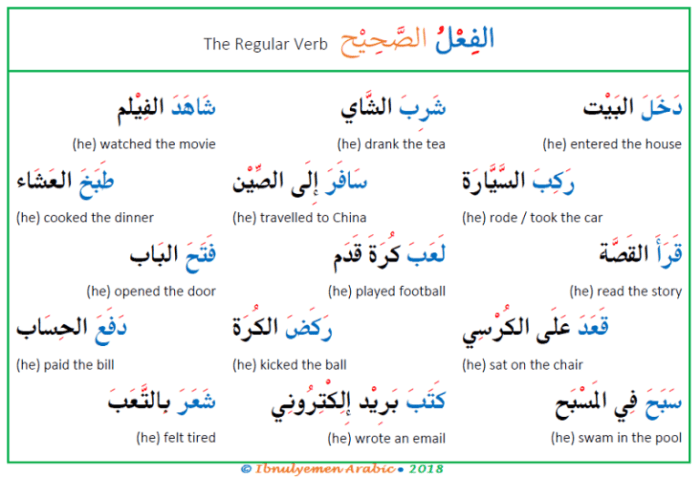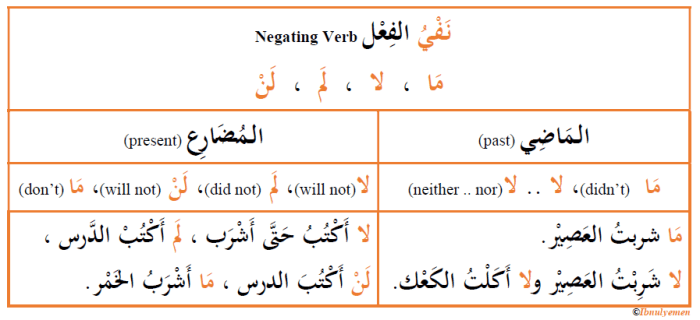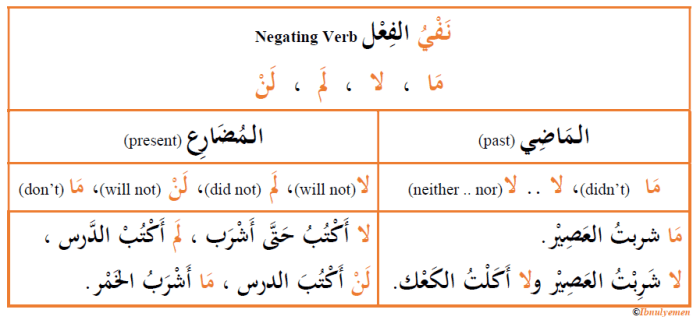Kata kerja larangan dalam bahasa arab disebut – Delving into the realm of Arabic grammar, we encounter a fascinating concept known as “kata kerja larangan,” or prohibited verbs. These verbs hold a unique place in the language, serving specific functions and adhering to distinct grammatical rules. Embark on this journey as we explore the intricacies of prohibited verbs in Arabic.
Prohibited verbs, as their name suggests, express actions or states that are forbidden or undesirable. They play a crucial role in conveying prohibitions, warnings, and negative commands. Understanding their formation, types, and usage is essential for mastering the nuances of Arabic grammar.
Introduction to Prohibited Verbs in Arabic Grammar
Prohibited verbs in Arabic grammar are a specific group of verbs that express actions that are forbidden or prohibited by religious or social norms.
These verbs are characterized by their unique form and usage, and they play an important role in conveying prohibitions and warnings in Arabic language.
Formation of Prohibited Verbs
Prohibited verbs in Arabic are formed by adding the prefix “la” (لَا) to the imperfect form of the verb.
For example:
- فعل (do): لا تفعل (do not do)
- كتب (write): لا تكتب (do not write)
- تكلم (speak): لا تتكلم (do not speak)
It’s important to note that the prefix “la” can also be used to form negative sentences, but in the case of prohibited verbs, it specifically indicates a prohibition or command not to do something.
Types of Prohibited Verbs

Prohibited verbs, also known as al-mamnū’āt al-ṣarfiyya, are a class of verbs in Arabic grammar that are not conjugated in the same way as regular verbs. They are divided into several types, each with its own grammatical rules and characteristics.
Primary Prohibited Verbs, Kata kerja larangan dalam bahasa arab disebut
Primary prohibited verbs are those that cannot be conjugated in any of the Arabic verb forms. They are always in the past tense and have a fixed form. Examples of primary prohibited verbs include:
- كان ( kāna)
- to be
- ما ( mā)
- what
- إنّ ( inna)
- verily
Defective Prohibited Verbs
Defective prohibited verbs are those that are missing one or more of the verb forms. They are typically conjugated in only one or two of the verb forms. Examples of defective prohibited verbs include:
- ليس ( laysa)
- is not
- عسى ( ʿasā)
- perhaps
- أين ( ayna)
- where
Assimilated Prohibited Verbs
Assimilated prohibited verbs are those that have been assimilated into the Arabic language from other languages. They are typically conjugated in a manner similar to regular verbs, but with some irregularities. Examples of assimilated prohibited verbs include:
- سمع ( samaʿa)
- to hear (from Hebrew)
- حبّ ( ḥabba)
- to love (from Aramaic)
- أرضى ( arḍā)
- to please (from Persian)
Functions of Prohibited Verbs
Prohibited verbs in Arabic grammar serve several crucial functions in sentences, primarily related to expressing prohibitions, obligations, and wishes.
Prohibiting Actions
Prohibited verbs are primarily used to prohibit or forbid actions. They convey a strong sense of negation or disapproval, indicating that a particular action should not be performed.
Dalam bahasa Arab, kata kerja larangan disebut “nahi”. Untuk memahami tata cara berzikir sesuai ketentuan, kita dapat merujuk pada Cara Berzikir Sesuai Ketentuan: Panduan Lengkap . Dengan mempelajari panduan ini, kita dapat memastikan bahwa zikir yang kita lakukan sesuai dengan tuntunan syariat dan mendatangkan keberkahan.
- Example:لا تشرب الخمر (Lā tashrab al-khamr) – Do not drink alcohol.
Expressing Obligations
In certain contexts, prohibited verbs can also express obligations or requirements. They convey a sense of necessity or duty, indicating that an action must be performed.
- Example:يجب أن تدرس بجد (Yajib an tudris bi-jidd) – You must study hard.
Expressing Wishes
Prohibited verbs can also be used to express wishes or desires. They convey a sense of hope or longing, indicating that the speaker wishes for something to happen or not happen.
- Example:ليتني أكون غنيًا (Laytanī akūnu ghaniyyًا) – I wish I were rich.
Semantic and Pragmatic Effects
The use of prohibited verbs has significant semantic and pragmatic effects on Arabic sentences.
- Semantic Effects:Prohibited verbs clearly convey the speaker’s attitude towards an action, whether it is disapproval, obligation, or desire.
- Pragmatic Effects:Prohibited verbs influence the tone and register of the sentence. They can create a sense of urgency, formality, or politeness, depending on the context.
Negation of Prohibited Verbs
Prohibited verbs are negated in Arabic by adding the negative particle lam(لم) to the beginning of the verb. The lamis followed by the imperfect form of the verb.
Examples of Negated Prohibited Verbs
- lam ya’kul(لم يأكل) – he did not eat
- lam tashrab(لم تشرب) – she did not drink
- lam yaktub(لم يكتب) – he did not write
Grammatical Rules for Negating Prohibited Verbs
There are a few grammatical rules that apply to the negation of prohibited verbs:
- The lamis always placed before the verb.
- The imperfect form of the verb is used after the lam.
- The subject pronoun is placed after the verb.
Prohibition in Arabic Grammar
Prohibition in Arabic grammar refers to the grammatical construction used to express the idea of forbidding or preventing an action. It is typically expressed using the particle “la” (لا) followed by the jussive mood of the verb.
Types of Prohibition
There are two main types of prohibition in Arabic grammar:
- Absolute Prohibition:This type of prohibition expresses a complete and unconditional ban on an action. It is typically used with verbs that have a negative connotation, such as “killing” or “stealing.” For example:
لا تقتل (Don’t kill)
- Relative Prohibition:This type of prohibition expresses a conditional or partial ban on an action. It is typically used with verbs that have a positive connotation, such as “eating” or “drinking.” For example:
لا تأكل الطعام النجس (Don’t eat unclean food)
Functions of Prohibition
Prohibition in Arabic grammar serves several important functions:
- Preventing harmful actions:Prohibition is used to prevent actions that could cause harm to individuals or society. For example, the prohibition against killing helps to protect human life.
- Encouraging good behavior:Prohibition can also be used to encourage positive behavior. For example, the prohibition against eating unclean food helps to promote healthy eating habits.
- Expressing religious beliefs:Prohibition is often used in religious texts to express religious beliefs and commandments. For example, the prohibition against consuming alcohol in Islam is based on religious teachings.
Negation of Prohibition
To negate a prohibition, the particle “ma” (ما) is used instead of “la.” For example:
ما تقتل (You must kill)
Imperative Mood and Prohibited Verbs
In Arabic grammar, the imperative mood is used to express commands, requests, or suggestions. When used with prohibited verbs, the imperative mood conveys a sense of prohibition or warning against performing a particular action.
To use prohibited verbs in the imperative mood, the following grammatical rules apply:
- The verb is conjugated in the second person singular or plural form.
- The verb is preceded by the negative particle “la” (لَا).
- The subject pronoun is omitted.
Here are some examples of sentences using prohibited verbs in the imperative mood:
- لَا تَشْرَبْ الخَمْرَ. (Don’t drink alcohol.)
- لَا تُكَذِبْ. (Don’t lie.)
- لَا تَسْرِقْ. (Don’t steal.)
Subjunctive Mood and Prohibited Verbs
The subjunctive mood is used in Arabic to express a wish, a command, or a condition that is contrary to fact. Prohibited verbs are a type of verb that is used to express a negative command or prohibition. When used together, the subjunctive mood and prohibited verbs can create a strong sense of urgency or importance.
There are a few grammatical rules that must be followed when using prohibited verbs in the subjunctive mood. First, the verb must be in the third person masculine singular form. Second, the verb must be preceded by the particle “la.”
Third, the subject of the verb must be in the nominative case.
Here are some examples of sentences using prohibited verbs in the subjunctive mood:
- “La yakun anta kathiran fi al-bayt.” (Do not stay in the house for too long.)
- “La ta’kul al-ta’am al-ladhi la tahubbuhu.” (Do not eat the food that you do not like.)
- “La tashrab al-khamr.” (Do not drink alcohol.)
Jussive Mood and Prohibited Verbs
The jussive mood is used to express a request, a command, or a prohibition. Prohibited verbs are a type of verb that cannot be used in the jussive mood.
The following are some examples of sentences using prohibited verbs in the jussive mood:
- لا تأكل الطعام. (Don’t eat the food.)
- لا تشرب الماء. (Don’t drink the water.)
- لا تذهب إلى المدرسة. (Don’t go to school.)
The grammatical rules for using prohibited verbs in the jussive mood are as follows:
- The verb must be in the third person singular or plural.
- The verb must be preceded by the negative particle لا.
- The verb must be followed by the object of the verb.
Syntactic Structure of Prohibited Verbs

Prohibited verbs in Arabic follow a specific syntactic structure that determines their function and meaning within a sentence. Understanding this structure is crucial for constructing grammatically correct sentences and effectively expressing prohibitions in Arabic.
Basic Sentence Structure
Sentences containing prohibited verbs typically adhere to the following basic structure:
- Subject:The person or thing performing the prohibited action.
- Prohibited Verb:The verb indicating the action that is prohibited.
- Complement (Optional):An object or other element that provides additional information about the prohibited action.
For example:
- Subject:أنت (you)
- Prohibited Verb:لا تأكل (do not eat)
- Complement:التفاح (the apple)
In this sentence, “أنت” (you) is the subject, “لا تأكل” (do not eat) is the prohibited verb, and “التفاح” (the apple) is the complement indicating the prohibited action.
In Arabic, prohibitive verbs are known as “fi’l nahy”. These verbs are used to express a prohibition or a command not to do something. For example, the verb “la ta’kul” means “do not eat”. To learn more about how to use prohibitive verbs in Arabic, you can refer to the article on Cara Mengolah Hasil Panen: Teknik Persiapan dan Metode . This article provides a comprehensive guide on how to process harvested crops, including techniques for preparation and methods for storage.
Understanding the use of prohibitive verbs is essential for effective communication in Arabic, as it allows you to convey commands and prohibitions clearly and accurately.
Variations in Sentence Structure
While the basic sentence structure remains consistent, there can be variations in the order and presence of elements within prohibited verb sentences.
- Complement First:In some cases, the complement may appear before the subject and prohibited verb.
- Multiple Complements:Sentences can contain multiple complements, providing more detailed information about the prohibited action.
- Negation:Negation of prohibited verbs follows specific grammatical rules, using the particle “ما” (not) before the verb.
For example:
- Complement First:التفاح لا تأكله (The apple, do not eat it)
- Multiple Complements:لا تأكل التفاح ولا تشربه (Do not eat the apple nor drink it)
- Negation:ما تأكل التفاح (You do not eat the apple)
By understanding the syntactic structure of prohibited verbs, learners can effectively construct grammatically correct sentences and convey prohibitions accurately in Arabic.
Semantic Analysis of Prohibited Verbs
Prohibited verbs, also known as the nawahiin Arabic grammar, are a class of verbs that express a sense of prohibition or negation. These verbs are distinct from negative verbs, which simply negate the meaning of a verb, and instead convey a stronger sense of prohibition or discouragement.
Semantically, prohibited verbs fall into several categories, including:
Categories of Prohibited Verbs
- Imperative Prohibitions: These verbs express a direct prohibition or command not to do something. For example, the verb la taqrub(don’t approach) prohibits someone from approaching a particular place or person.
- Optative Prohibitions: These verbs express a wish or desire that something not happen. For example, the verb la yashrab(may he not drink) expresses a wish that someone does not drink alcohol.
- Dubitative Prohibitions: These verbs express doubt or uncertainty about whether something will happen. For example, the verb la yabqa(may he not remain) expresses doubt about whether someone will remain in a particular place.
- Potential Prohibitions: These verbs express the potential or possibility that something will not happen. For example, the verb la yastați(he may not be able to) expresses the possibility that someone will not be able to do something.
Pragmatic Analysis of Prohibited Verbs: Kata Kerja Larangan Dalam Bahasa Arab Disebut

Prohibited verbs are used to express a range of pragmatic functions, including:
- Advising or recommending:Prohibited verbs can be used to give advice or recommendations in a polite and indirect way. For example, the sentence “You should not smoke” is a more polite way of saying “I recommend that you quit smoking.”
- Expressing disapproval:Prohibited verbs can be used to express disapproval of someone’s actions or behavior. For example, the sentence “You should not have done that” expresses disapproval of the person’s actions.
- Giving warnings:Prohibited verbs can be used to give warnings about potential consequences. For example, the sentence “You should not go out alone at night” warns the person of the potential dangers of going out alone at night.
- Expressing prohibitions:Prohibited verbs can be used to express prohibitions or rules. For example, the sentence “You should not steal” is a prohibition against stealing.
The pragmatic effects of using prohibited verbs can vary depending on the context in which they are used. For example, using a prohibited verb to give advice can be seen as more polite and indirect than using a direct imperative.
Using a prohibited verb to express disapproval can be seen as more forceful than using a simple statement of disapproval. Using a prohibited verb to give a warning can be seen as more serious than using a simple statement of warning.
And using a prohibited verb to express a prohibition can be seen as more authoritative than using a simple statement of prohibition.Here are some examples of sentences illustrating the pragmatic functions of prohibited verbs:
- Advising or recommending:“You should study harder for your exams.”
- Expressing disapproval:“You should not have spoken to her like that.”
- Giving warnings:“You should not drive when you are tired.”
- Expressing prohibitions:“You should not smoke in this building.”
Closing Notes
In conclusion, prohibited verbs in Arabic grammar offer a rich and complex linguistic tool for expressing prohibitions and conveying negative sentiments. Their versatility extends across various sentence structures and moods, allowing for precise and nuanced communication. Whether used in everyday conversations or formal written discourse, prohibited verbs add depth and clarity to the Arabic language.
FAQ Corner
What are prohibited verbs in Arabic grammar?
Prohibited verbs are a class of verbs that express actions or states that are forbidden or undesirable.
How are prohibited verbs formed?
Prohibited verbs are formed by adding the prefix “la” to the present tense form of the verb.
What are the different types of prohibited verbs?
There are three main types of prohibited verbs: permanent, temporary, and contextual.
How are prohibited verbs negated?
Prohibited verbs are negated by adding the negative particle “ma” to the beginning of the verb.
What are some examples of prohibited verbs?
Some examples of prohibited verbs include “la takula” (do not eat), “la tashrab” (do not drink), and “la tadkhul” (do not enter).

